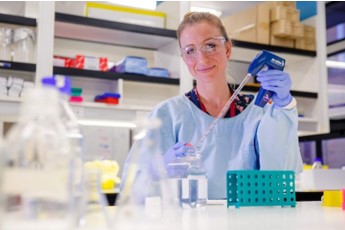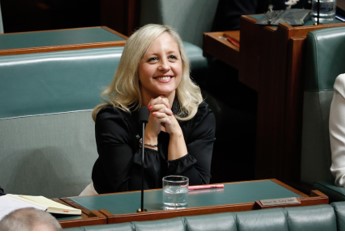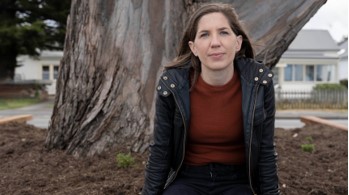Covid19 Complications:
There has been many suggestions that caution should be on the table with the vaccinations associated with the Covid19 virus and now some evidence has come out that the caution that was not being used ought to have been given far more weight than the Health Ministers and political leaders were giving to those concerns during the difficult days of 2019 through to 2023. It is now revealed that as with most vaccines there are some unintended consequences that have and can have serious consequences for those with certain reactions to the vaccines being used.
The Australian Broadcasting Commission today (25/04/2023) reported the following story:
Long COVID research pledge prompts push to consider mystery links to other illness
By the Specialist Reporting Team’s Brad Ryan
Posted 15h ago15 hours ago, updated 6h ago6 hours ago

Life and work began to intersect for Melissa McIntosh when her son developed diabetes after having COVID-19.(Supplied: Office of Melissa McIntosh)
Help keep family & friends informed by sharing this article
abc.net.au/news/long-covid-report-sparks-push-for-research-into-linked-illnesses/102262582
Byron McIntosh first began to wonder if something was wrong with him when no amount of water would quench his insatiable thirst.
Key points:
- There’s growing evidence linking COVID-19 to the onset of diabetes
- The federal government has promised $50 million for research into long COVID
- Meanwhile, there are calls for research into how COVID-19 could trigger other illnesses
He was drinking up to five litres a day, and still constantly feeling thirsty.
An aspiring Olympian, the then 19-year-old put it down to the increased training he was doing in his sport of choice – judo.
But then his body began to rebel in other ways.
One day, his father saw him behaving strangely, staring blankly at a wall in a “zoned out” state.
“It was just like my head wasn’t working,” Byron said.
His father raced him to a GP and, after a urine test, the GP told them to head straight to the emergency department.
“I was feeling pain in my kidneys,” Byron said. “I was not aware of my surroundings completely. I was told at the time, as I was conversing with someone, I was just looking beyond them.”
Tests revealed his blood sugar levels were dangerously elevated. “A doctor [said] my blood was essentially syrup.”
The diagnosis was clear — Byron had type 1 diabetes.
COVID a possible trigger
Type 1 diabetes — where the body stops making insulin, causing blood sugar to build up in the blood stream — is unrelated to diet and lifestyle.

Byron McIntosh initially thought his unquenchable thirst was related to increased judo training.(Supplied: Pascal de Pree)
It can strike without rhyme or reason, but usually develops in childhood or adolescence.
People around Byron, his family and some healthcare providers wondered if Byron’s diabetes could be linked to his recent bout of COVID-19.
Like most vaccinated young people, his experience of COVID-19 wasn’t remarkable, but even mild viruses are considered possible triggers for diabetes.
“One of my first questions to an infectious diseases specialist was could Byron have gotten type one diabetes because of COVID,” his mother said. “And the response was, it’s plausible, but we just don’t have the data.”
There’s now a growing body of medical literature to suggest being infected with COVID-19 does increase a person’s chances of developing diabetes.
Kirsty Short, a University of Queensland virologist who has researched the links between viruses and diabetes, said the evidence COVID-19 could trigger type 1 diabetes was strongest in children.

Dr Kirsty Short says evidence linking COVID-19 to the onset of diabetes is strengthening.(Supplied)
However, recent research is establishing a firmer link in adults too. A Canadian study published last week suggests up to one-in-20 new diabetes cases could be linked to COVID-19. (That study, though, could not distinguish between diabetes types 1 and 2.)
“I really think that the link is there, and I think that matches with people’s firsthand experience as well,” Dr Short said.
“I think the question we now need to be asking is not whether the link is there, but how to stop it.”
Inquiry evidence becomes personal
When Byron got ill, life and work began to intersect for his mother, Melissa McIntosh.
She’s the Liberal MP for the Sydney seat of Lindsay, and the deputy chair of the parliamentary committee that’s been investigating long COVID.
Ms McIntosh had pushed for the inquiry to be established after her own experience with lingering COVID-19 symptoms and the lack of quality information she could find.
However, after her son’s diagnosis last year, the inquiry became even more personal. And the parliamentary probe began hearing more evidence of recovered COVID patients developing other conditions.

Melissa McIntosh wants research to look at COVID-19’s link to other severe illness.(ABC News: Matt Roberts)
Diabetes Australia called for funding to investigate COVID-related new onset diabetes.
The Stroke Foundation warned an increased risk of stroke associated with COVID-19 “could have a significant impact on the future burden of stroke”.
And the Florey Institute of Neuroscience and Mental Health said “mounting evidence that COVID-19 results in long-term neurological problems … is highly concerning for the capacity of Australian healthcare and social systems”.
Victoria’s Department of Health even told the inquiry that a national definition of long COVID, which is yet to be developed, should “include both ‘long COVID’ symptoms and post-COVID conditions … such as the increased risk of diabetes, heart attacks and strokes”.
‘Only just scratched the surface’
A lack of quality data, and a pressing need for more research, were common themes canvassed at the inquiry.
Its final report, released on Monday, came with a recommendation for a nationally coordinated research program.
The government has promised $50 million for that research.
Ms McIntosh wants some of that funding to be used to research the links — some still unproven — between COVID-19 and other severe diseases.
“I think we’ve only just scratched the surface on this,” Ms McIntosh said.
“And now it’s time to hunt down some answers and then look at whether our hospitals, whether GPs are ready for it, whether our whole public health system is prepared for what could come – because COVID, as we know, is far from over.”
Dr Short agrees.
“We need to understand how this is occurring and how do we prevent this from occurring, because diabetes is a chronic, lifelong condition and it’s a significant challenge to manage on a day-to-day basis.”
Committee calls for specific chronic fatigue research
There are hopes the inquiry – and the promised subsequent research – will also lead to a better understanding of illnesses like chronic fatigue syndrome.
Australian National University virologist Brett Lidbury, who researches post-viral fatigue syndromes, was pleased to see the condition referenced in the committee’s recommendations.
Do you have a story to share? Email *************@*****et.au“>Sp*************@*****et.au
Despite falling outside the inquiry’s terms of reference, the committee specifically called for research funding to be spent investigating chronic fatigue syndrome.
Dr Lidbury said many patients were neglected by the health system.
“The patient experience more or less says that in general they’re ignored or disbelieved,” Dr Lidbury said. “There were guidelines for medical practitioners published in 2002, so you can imagine – they’re over 20 years out of date now.”
My year in the fog — and how I found my way out

Also known as myalgic encephalomyelitis or ME/CFS, the condition shares many similarities with long COVID.
Some experts, including Dr Lidbury, believe long COVID is the post-viral form of ME/CFS.
He said that means 30 years of dedicated post-viral fatigue research could give scientists “a massive head-start” in understanding long COVID.
The Department of Health and Aged Care has now been tasked with putting together a national plan to respond to the committee’s findings.
Research grants are expected to become available from August.
0000000000000000000000
Conclusions:
- It was unwise to compel people to be vaccinated without full consideration of potential future health concerns.
- The vaccines needed a lot more testing before being rolled out in the manner that they were.
- The political and health panic did distort safe and best health practice.
- The people dismissed from their jobs due to health concerns over the vaccinations ought to be fully compensated for their losses
- The Chief Medical Officers of Australia and each and every state of Australia should humbly apologise to all Australians
- The political leaders of Australia and each and every state should apologise to all Australians.
- All people who developed complications should be compensated for their developed health issues.

